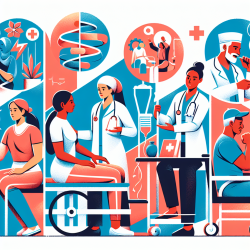The recent research article, "Sociodemographic Characteristics and Mental and Physical Health Diagnoses of Yazidi Refugees Who Survived the Daesh Genocide and Resettled in Canada," provides a comprehensive analysis of the multifaceted health needs of Yazidi refugees. As practitioners dedicated to creating positive outcomes for children, it is imperative that we integrate these findings into our therapeutic practices, especially when providing online therapy services through platforms like TinyEYE.
Key Findings from the Research
The study identified several critical areas where Yazidi refugees, particularly children, exhibit significant health challenges:
- Mental Health Conditions: A high prevalence of PTSD, anxiety disorders, and depressive episodes was noted, particularly among women and children.
- Somatoform Disorders: Many refugees presented with unexplained physical symptoms such as abdominal pain, headaches, and dizziness, likely stemming from psychological trauma.
- Family Separation: Nearly all families experienced separation, exacerbating the mental health challenges faced by these individuals.
Implementing Research Findings in Speech-Language Pathology
To improve outcomes for Yazidi refugee children, speech-language pathologists can take the following data-driven actions:
1. Trauma-Informed Care
Integrate trauma-informed care principles into therapy sessions. This involves understanding the profound impact of trauma on a child's communication abilities and being sensitive to their experiences. Establishing a safe and supportive environment is crucial.
2. Holistic Assessment
Conduct comprehensive assessments that consider both mental and physical health conditions. Utilize tools that can identify somatoform disorders and mental health issues, which may manifest as speech and language difficulties.
3. Collaborative Approach
Work closely with other healthcare providers, including mental health professionals, to address the multifaceted needs of these children. Collaboration ensures that all aspects of a child's health are considered and treated.
4. Family Engagement
Involve family members in the therapy process whenever possible. Family support is essential for the child's progress and helps mitigate the effects of family separation.
5. Culturally Sensitive Practices
Understand and respect the cultural background of Yazidi refugees. Tailor therapy sessions to be culturally appropriate, which can enhance the effectiveness of the interventions.
Encouraging Further Research
While the current study provides valuable insights, ongoing research is needed to continuously improve therapeutic approaches. Practitioners are encouraged to:
- Participate in or conduct studies that explore the long-term outcomes of therapy for Yazidi refugee children.
- Investigate the efficacy of specific therapeutic interventions tailored to trauma-affected populations.
- Share findings and best practices with the broader speech-language pathology community to enhance collective knowledge and practice.
Conclusion
Integrating the findings from the study on Yazidi refugees into speech-language pathology practice can significantly enhance the therapeutic outcomes for these children. By adopting trauma-informed care, conducting holistic assessments, collaborating with other professionals, engaging families, and being culturally sensitive, practitioners can provide more effective and compassionate care.To read the original research paper, please follow this link:
Sociodemographic Characteristics and Mental and Physical Health Diagnoses of Yazidi Refugees Who Survived the Daesh Genocide and Resettled in Canada.










